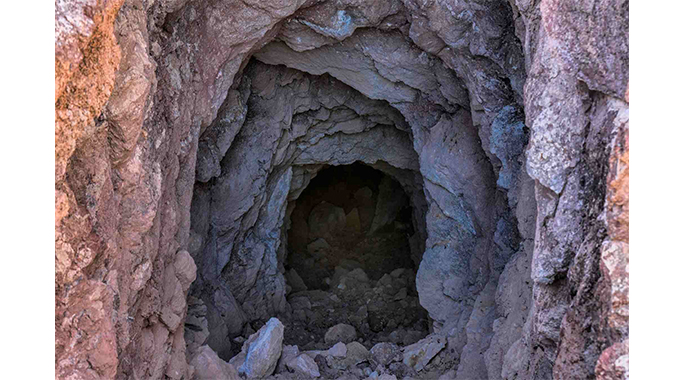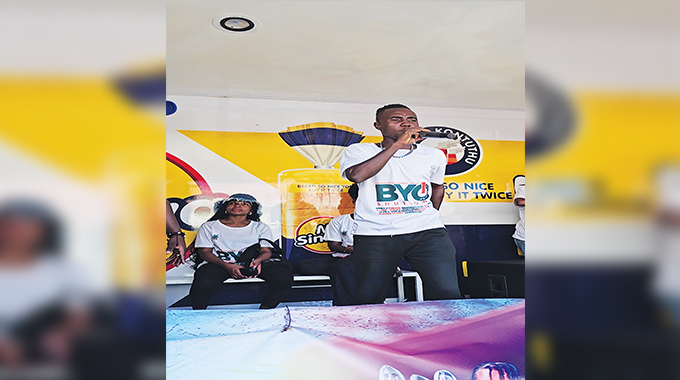Pathisa Nyathi, the forgetful man who reminds us about our heritage

Bongani Ndlovu, Showbiz Reporter
“HELLO. I will be with you in a moment. I just want to finish this sentence,” Pathisa Nyathi told a news crew that visited him at his home in Gwabalanda last week.
Nyathi, who was seated in the living room, typing away at his laptop, on a desk heaped with books was clearly engrossed in what he was typing. The man has been writing about history, culture and heritage for 30 odd years and has become a reference point for anyone who wants the low down on these topics.
One would not be wrong to label Nyathi a walking encyclopaedia. Just spending an hour or so with him, talking about life, rather, him talking and you listening, is sure not to leave you the same. His presence is just different. It has to be something about his passion, dedication or his resilience, the energy is just contagious.
Earlier this month, when President Mnangagwa and Vice President Constantino Chiwenga came to Bulawayo for the Bulawayo Arts Festival and Heritage Corridor tour, it was befitting that the renowned mind in heritage, arts and culture was the one who took them on a tour of the first three sites, the Inxwala Site, The Hanging Tree and the Joshua Nkomo statue. Nyathi has written extensively about these and other heritage topics in books and columns in the media.
But not much is known about him outside his work in arts, culture and heritage. Interestingly, what he was busy writing before he sat down with the Saturday Leisure crew was his autobiography that, according to him, needs to be released during his 70th birthday celebrations at his rural village of Sankonjana, Kezi, Matabeleland South Province. Although his birthday will be on the 10th of July, Nyathi said the celebrations will be much later as he does not like winter.
The book has tentatively been titled, Pathisa Nyathi at 70: A life dedicated to arts culture and heritage.
After some pleasantries, Nyathi sits down and opens up on his life and why it has taken so long for him to write about himself. This is because although he has a sharp memory and can articulate and write about culture, heritage and the arts, Nyathi says he feared, before he started writing, that he would forget many important instances from his past.
“I’m turning 70 and busy writing my autobiography which I thought was going to be largely pictorial or photographic because I always feared that I had no memory and wasn’t going to come up with something meaningful, objective and, sustainable. The moment I started sitting behind my laptop and writing, I discovered there were a lot of things that I do remember and perhaps better when I start working and writing. But just remembering for no purpose is where I think I face a challenge,” said Nyathi.
In order to freely express himself, Nyathi said he works better without a plan as he wants to write from his heart.
“I realised that with the book that I’m writing as it isn’t planned. If I sit down and do a framework of what I must write, I can’t write. I want to write from my heart. Unplanned!”
While still talking about the forthcoming book, he reveals how he believes things are coming together and thinks perhaps this is a sign that he is about to leave God’s green earth.
“At the same time, things are coming along together for some unknown reason as if I’m preparing my final exit. Awards have been coming one after the other. So, it’s the book, turning 70 and these awards. This has come together to a point that you say, even if the angels or my ancestors summon me, I wouldn’t say it was a premature departure from planet earth. It’s as if everything has come together, well-organised, synchronised and concluded in a very beautiful way,” said Nyathi.
A snippet into his life, Nyathi reveals that he grew up in a polygamous family as his father, George Menyezwa Nyathi, had two wives, one of them being his mother, Selina Ndlovu.
Although he had other siblings, Nyathi said his mother used to miscarry up to a point that his parents decided to seek help from the Njelele Shrine in Matobo. He described himself as a “miracle baby” as he was conceived after a visit to the shrine with his name embedded in spirituality that he strongly believes in.
“My mother used to miscarry and it got to a point that they were no longer certain they would have children with my father. Siyaphathisa abanye which means that they were not very sure that this child was going to survive, but today I’m celebrating 70 years as a resident on planet earth.
“It means the child survived where others failed to make it and that’s what’s special perhaps about me and my name.
“I was born within a context of spirituality, because when conception failed, my father approached the religious shrine which is Njelele in the Matobo Hills,” explained Nyathi.
He went on to say years later, people still visit the shrine for various purposes.
“What used to happen back then and still happens even today, as I took some people there some days ago, people would come requesting for various things, some for ways to get a husband and others how to conceive. The lady there, maNyathi, then told them that when they get the baby, they must come back and inform her that the request was fulfilled.
“So, I don’t know whether my father went back and thanked them for the baby they asked for. But the bottom line is that I’m here and a product from God as a request from my father,” said Nyathi.
Explaining his surname, he said their Nyathi is not a totem – meaning they do not eat Buffalo meat – as their totem is actually a dove.
“With the totem being a Nyathi, we won’t be allowed to eat meat from a Buffalo, which is a brother to a cow. This will mean we shouldn’t eat beef, but we do eat it. Our totem is the dove, that’s the bird we don’t touch, we taboo that one.
“When our mothers are suckling Nyathi babies, they don’t consume that bird. It’s a special bird to us. The totemic name is your spiritual DNA so there’s a lot of history in those two, my name (Pathisa) and the surname (Nyathi). But we didn’t have surnames in the past. It was Mzilikazi kaMatshobana, not Mzilikazi Khumalo. These surnames were introduced by colonialism to make us pay tax. Does Queen Elizabeth have a surname?” quizzed Nyathi.
He also shared that in his culture as a Nyathi, there are a lot of intermarriages as his father was supposed to marry a maNyathi.
“I was born in winter and I hate winter conditions. For that reason, my birthday (July 10) will be a belated celebration. Among the Nyathi people, we do intermarry. A Nyathi can marry a Nyathi and it’s not a big issue as long as your houses are different.
“We’re Nyathis, but we are known as the Serumula or Lupathe people. We have others who’re Gubadu people and others who’re Lukiko people so there’re intermarriages among the people,” said Nyathi.
“But there are economic dynamics to it; keeping cattle in the same group so that my son marries my sister’s daughter. These are what are called preferred cousins in Sotho culture. So, we practice a lot of that. It’s a way of preserving cattle to retain our wealth.”
Asked if there was an indication that he would be involved in the arts, culture, and heritage from his childhood, Nyathi said he had an affinity to spend time with adults in order to gain knowledge.
“There are certain traits that you can pick out from a child when they are young that can give you an indication about their talent or what they will grow up to be. When I was young, I wanted to associate more with adults than people my age. Because if you are around siblings, there is very little that you learn from them. From the book that I’m writing I mention one brother – Ranie who I interacted with and look at my history and early life through him,” said Nyathi.
Narrating the life of a young Pathisa, he said he used to spend most of his time outside eavesdropping on the conversations of elders and playing around the yard in Sankonjana.
“I hadn’t started herding cattle and goats and I used to play games confined in the homestead. We’d mould cattle from mud and play with them. When I was older, we’d trap birds, look for inkelo and do many activities in the bush with our peers.”
After his primary school sojourn at Sankonjana, Nyathi attended Mazowe Secondary School in Mashonaland Central from form one to form four. It was at high school in form three that Nyathi wrote a short story, No God in the cave, that he used to enter a competition. The story came second showing how talented he was.
Thereafter, he enrolled at Gweru Teachers’ College and graduated in teacher education in 1973. He did private studies and passed A’level biology and geography in 1976. He went on to pass a BA degree in Geography and Development Administration in 1981 and attained a BA (Honours) in Development Administration in 1984.
In between, Nyathi met his wife Elizabeth Nyathi in 1974 at Loreto Mission when he was a teacher and she was in Form Four. He married her on August 22, 1981 but she sadly died on April 24, 2016. The couple has three children, Sikhanyisile Sibanda, Butholezwe Kgosi Nyathi (National Gallery of Zimbabwe in Bulawayo, regional director) and Fikile Nyathi. He has three grandchildren Sibusiso Leeroy Sibanda, Londisizwe Nyathi, Kamogetsi Nyathi.
On his relationship with his children, Nyathi said all of them take after him.

Pathisa Nyathi with his son (Butholezwe Kgosi Nyathi), daughters (Fikile Nyathi and Sikhanyisile Sibanda) daughter -in-law ( Delight Nyathi) and grandchildren (Sibusiso Leeroy Sibanda, Londisizwe Nyathi, Kamogetsi Nyathi)
“My relationship with the children is excellent, I don’t think it could be better. I think all of them take after me because they are all hardworking. Look at Butho, he has revamped the gallery, looked for funds and all.
“Fikile is young, but I can see that she’s very hardworking and even the oldest. Hard work is a trait of the family. I didn’t invent it, I found it there.”
He went on to pay homage to his parents for grilling him to be a hard worker and the need to leave a mark on earth. This still drives him as a parent and scholar.
“My father was a hard worker who loved agriculture. The difference between myself and him is that he worked hard with the axe and I am a hard worker through what I do, leaving a mark on this earth. Working hard comes in different forms. I do it even when there is no supervision and that’s what I imparted to my children through example.
“I call it work ethos, not to work because you are being forced. Because a wheelbarrow can move only as far as the person who is pushing it. We want people who love to work, find joy, find life, solace, comfort, and meaning in work.
“There comes a time that when you come to earth and then you return to the afterlife. But you have to justify and give an account of why you were on earth. I wouldn’t want to get to that place, never mind what they call it, and I fail to account for my stay on earth. From my parents, I learnt to be upright and truthful,” said Nyathi.
Nyathi said his father whom he described as one of the early Injiva, would travel to South Africa to work there at the farms. Following his death, Nyathi developed a passion for farming.
A man of sober habits, Nyathi who has never drank alcohol, said he keeps fit by working hard.
Quizzed how he spends his time, Nyathi said if one does not find him at his Gwabalanda home, then they will definitely find him at his farm in Sankonjana or Amagugu International Heritage Centre.
“My daily routine involves working with books. Right now, I am doing my autobiography, at the same time I’m working on a biography about Joshua Nkomo. I’m also working on my anthology of poems and all these are in the pipeline. There’s a book that I’m dreaming about, Journey to Heaven or Journey to the Stars which essentially is about African knowledge of astronomy.
“On the other hand, I have Amagugu to attend to and cattle to look after at my rural home. I’m gainfully employed where I pay myself by working for my livestock, such as cattle, goats and sheep. Hopefully, in honour of my father, I’ll get into piggery as he loved rearing pigs. I go to bed not earlier than midnight and my business is in the home.”
And after 70 years on earth, is Nyathi content with the life he has led and has he achieved things he sought out to achieve.
“If you say that you’ve achieved all that you wanted, there’s no reason to be alive. You have to die because if you say you’re done, then you have to be idle and if you are idle, death will visit you. In life relatively, I’ve done something and I’m content, but there’s something that has to be done. If you wait for death it obliges.”
As a parting shot, Nyathi said he is looking forward to his birthday celebrations in Kezi, the place where it all began.










Comments